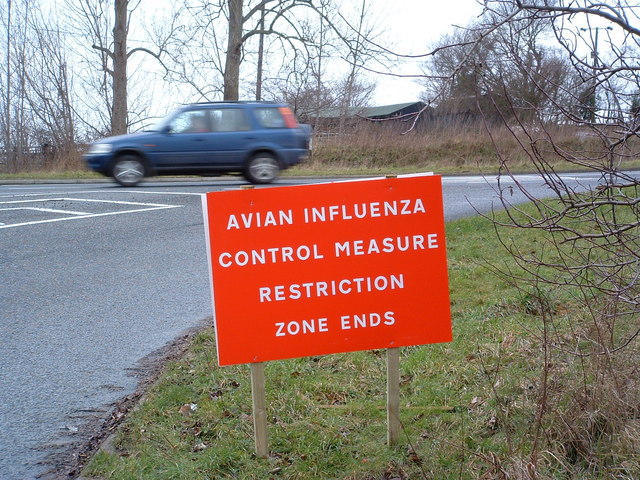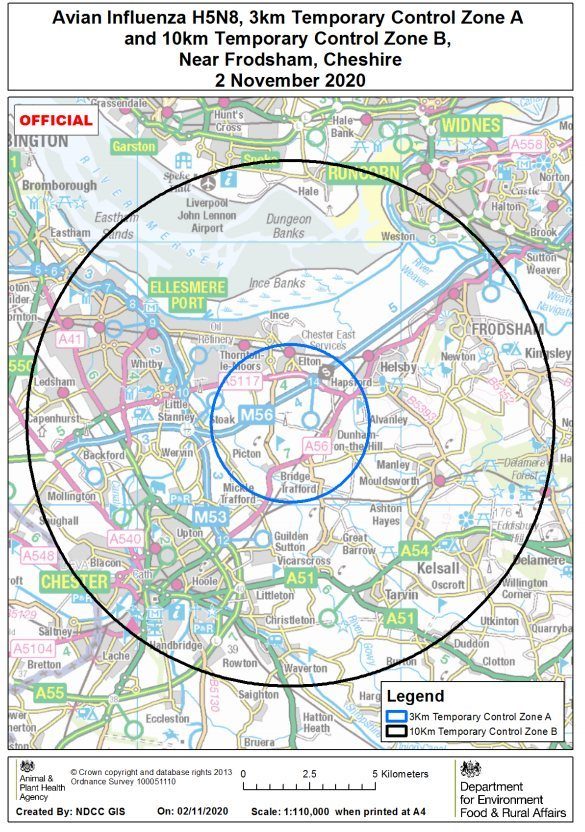Bird flu outbreak confirmed at Cheshire farm

An outbreak of H5N8 bird flu has been confirmed on a commercial poultry farm in Cheshire, the government has confirmed.
Avian influenza was discovered on Monday (2 November) at premises near Frodsham, Defra announced.
Testing has confirmed the virus was a highly pathogenic strain, and related to the virus currently circulating in Europe.
All 13,000 birds at the farm, which produces hatching eggs, will be culled to limit the spread of the disease.
A 3km and 10km temporary control zones have been put in place around the infected site to limit the risk of the disease spreading.
Defra said the case was unrelated to the H5N2 strain which was confirmed at a small commercial premises near Deal in Kent earlier today.
Public Health England (PHE) advised that the risk to public health from the virus was very low, and the Food Standards Agency added that it posed a very low food safety risk for consumers.
The UK's Chief Veterinary Officer Christine Middlemiss said: “Avian flu has been confirmed at a commercial farm near Frodsham in Cheshire.
"Immediate steps have been taken to limit the risk of the disease spreading and all remaining poultry at the farm will be culled.
“Bird keepers should remain alert for any signs of disease, report suspected disease immediately and ensure they are maintaining good biosecurity on their premises.
“We are urgently looking for any evidence of disease spread associated with this farm to control and eliminate it.”
Dr Gavin Dabrera, Consultant in Acute Respiratory Infections at Public Health England, said there had never been any confirmed cases of H5N8 in humans.
A detailed investigation is in progress to determine the most likely source of this outbreak.

What do I do if I suspect avian influenza?
Defra says suspected disease should be reported to the Animal and Plant Health Agency (APHA) offices immediately on 03000 200 301.
Clinical signs that keepers should look for in their birds include a swollen head, discolouration of neck and throat, loss of appetite, respiratory distress, diarrhoea and fewer eggs laid.
Where avian influenza is not strongly suspected, but cannot be ruled out, Defra says keepers should liaise with their private veterinarian about utilising the APHA ‘testing for exclusion’ regime.
This involves submitting samples to a testing service at the APHA’s National Reference Laboratory, Weybridge and can help detect a notifiable avian disease at the earliest opportunity for such cases.
Farmers and poultry keepers have also been told to follow strict biosecurity controls at all times:
• Keep the area where birds live clean and tidy, controlling rats and mice and regularly cleansing and disinfecting any hard surfaces
• Clean footwear before and after visits
• Place birds’ feed and water in fully enclosed areas that are protected from wild birds, and removing any spilled feed regularly
• Put fencing around outdoor areas where birds are allowed and limiting their access to ponds or areas visited by wild waterfowl
• Where possible, avoid keeping ducks and geese with other poultry species.








